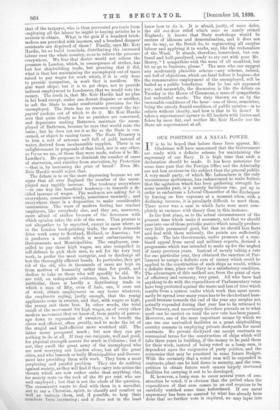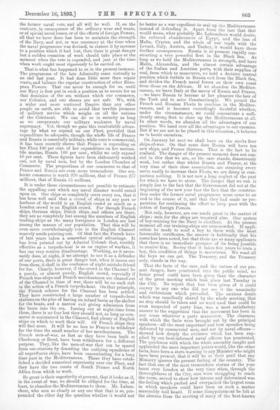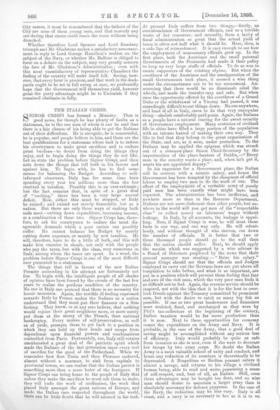OUR POSITION AS A NAVAL POWER.
IT is to be hoped that before these lines appear, Mr. Gladstone will have announced that the Government are ready with a definite scheme for maintaining the supremacy of our Navy. It is high time that such a declaration should be made. It leas been notorious for sonic time past that the Foreign Office and the Admiralty are not less anxious on the subject than the general public. A very small party, of which Mr. Labouchere is the only venturesome spokesman, has endeavoured to make believe that the agitation which has been gathering strength for some months past, is a merely factitious one, got up in order to embarrass a Liberal Chancellor of the Exchequer by forcing on him expenses at a moment when, with a declining revenue, it is peculiarly difficult to meet them. There never was a case in which facts were more com- pletely at variance with theory than in this instance. In the first place, as to the actual circumstances of the present time which make it necessary, not that we should pass into one of those periodic panics which usually produce very little permanent good, but that we should face facts and deal with them seriously, the points are sufficiently simple. The late Government, under pressure of a com- bined appeal from naval and military experts' devised a programme which was intended to make up for the neglect of many previous years. Instead of merely taking a vote for one particular year, they obtained the sanction of Par- liament to assign a definite sum of money which could be applied to the construction of such ships as would, within a definite time, place our Navy in a satisfactory condition. The advantages of this method are, from the point of view of efficiency and economy, very great. All who have had anything to do with the expenditure of Parliamentary votes have long protested against the waste and loss of time which results from a system under which work that must neces- sarily be spread over many years has to be checked and ham- pered because towards the end of the year any surplus not actually expended during that year has to be returned to the Treasury, and uncertainty therefore prevails as to what work can be carried on until the new vote has been passed. Moreover, one of the most important means by which we can use our unrivalled facilities as a great shipbuilding country consists in employing private dockyards for naval contracts. No private dockyard can accept contracts on economical terms for the construction of ships which will take three years in building, if the money to be paid them for their work, instead of being voted as a lump sum, is dependent upon the exigencies of party politics, and the economies that may be practised in some future Budget. With the certainty that a voted sum will be expended in contracts, plant can be laid down in security, and the com- petition to obtain future work causes largely increased facilities for carrying it out to be developed. If, however, a lump sum to cover several years of con- struction be voted, it is obvious that the period when the expenditure of that sum comes to an end requires to be carefully watched some time beforehand. If our naval supremacy has been so assured by what has already been done that no further vote is required, we may lapse into
..••■■••••••••••••■•••
the former naval vote, and all will be well. If, on the contrary, in consequence of the ordinary wear and waste, or of special naval losses, or of the efforts of foreign Powers, all that we have done has been to maintain the strength of the Navy, and not, as was necessary at the time when the naval programme was devised, to restore it by increase to a position which it had lost, then there is great danger lest a sudden cessation of work should take place at the moment when the vote is expended, and just at the time when work ought most vigorously to be carried on. That is what has happened to us in the present instance. The programme of the late Admiralty came virtually to an end last year. It had done little more than repair waste, and balance the regular construction of other Euro- pean Powers. That can never be enough for us, until our Navy is first put in such a position as to secure for us that dominion of the sea without which our commerce, our Colonies, and our shores are not safe. We, with a wider and more scattered Empire than any other people on earth, are able to avoid that terrible pressure of military service which weighs on all the nations of the Continent. We can do so in security as long as we compensate our military weakness by naval supremacy. Yet, though we gain this incalculable advan- tage by what we expend on our Fleet, provided that expenditure be adequate, though the whdle life of France and Russia is essentially military, while ours is commercial, it has been recently shown that France is expending on her Fleet 100 per cent. of her expenditure on her mercan- tile marine, Russia 160 per cent., whilst we only expend 16 per cent. These figures have been elaborately worked out, not by naval men, but by the London Chamber of Commerce. The proportions of our commerce to that of France and Russia are even more tremendous. Our sea- borne commerce is worth 970 millions, that of France 277 millions, that of Russia 55 millions.
It is under these circumstances not possible to estimate the appalling cost which any naval disaster would entail upon us. Our ships so completely cover every sea, that it has been well said that a crowd of ships in any port or harbour of the world is an English crowd as much as a London crowd is an English crowd. For though French ships, German ships, Dutch ships, and others are there, they are as completely lost among the numbers of English trading-ships as the many foreigners in London are lost among the masses of our population. That this will be even more overwhelmingly true in the English. Channel scarcely needs pointing out. Of that fact the French have of late years taken a somewhat cynical advantage. It has been pointed out by Admiral Colomb that, terribly effective as a torpedo-boat is as an engine of warfare, it has one very serious disadvantage. Working, as it neces- sarily does, at night, if we attempt to use it as a defender of our ports, there is great danger lest, when it issues out from them, it shall in the confusion of night mistake friend for foe. Clearly, however, if the crowd in the Channel be a purely, or almost purely, English crowd, especially if French war-ships and French merchantmen are cleared out of the Channel in time of war, there will be no such risk in the action of a French torpedo-boat. On that principle, the French scheme for the Channel has been settled. They have constructed a large number of torpedo-boat stations on the plan of having an inland basin as the shelter for the boats, and a narrow exit giving admission from the basin into the sea. Issuing out at night-time from these, there is no fear lest they should not, as long as com- merce is maintained in the Channel, find plenty of English ships on which to work their will. Of French ships they will find .none. It will be no loss to France to withdraw for the time the small number of her merchantmen. The French men-of-war, as fast as they have been built at Cherbourg or Brest, have been withdrawn for a different purpose. They, like the men-of-war that can be spared from out-stations by denuding the outlying squadrons of all superfluous ships, have been concentrating for a long time past in the Mediterranean. There they have estab- lished a decided numerical superiority over our Fleet, and they have the two coasts of South France and North Africa from which to work.
So great is their superiority at present, that it looks as if, in the event of war, we should be obliged for the time, at least, to abandon the Mediterranean to them. Mr. Labou- chere, who sees as clearly as any one that that is so, pro- pounded the other day the question whether it would not be better as a war expedient to seal up the Mediterranean instead of defending it. Apart from the fact that that would mean, what probably Mr. Labouchere would desire, the enforced abandonment of Egypt, and the loss of Malta, Cyprus, and the whole of our trade with the Levant, Italy, Austria, and Turkey, it would have these further consequences. Russia is at present rapidly con- structing a, very powerful fleet in the Black Sea. As long as we hold the Mediterranean in strength, and have Malta, Alexandria, and the almost certain advantage of the Italian and Austrian ports, with their supplies of coal, from which to manoeuvre, we hold a decisive central position which forbids to Russia exit from the Black Sea, and divides the French naval forces on their own coast from those on the African. If we abandon the Mediter- ranean, we leave Italy at the mercy of Russia and France, —we leave Russia to become at her pleasure the heir of the Turk and to seize Constantinople. We permit the French and Russian Fleets to combine in the Mediter- ranean, and it becomes exceedingly doubtful whether, under the circumstances, we could concentrate a suffi- ciently strong fleet to close up the Mediterranean at all. In other words, we abandon all the advantages of our position. We hand over all the advantages to our enemies. But if we are not to be placed in this situation, it behoves us to bestir ourselves.
On January 1st next we shall have on the stocks four ships-of-war. On that same date Russia will have ten new ships, and France thirteen. That is the fact to be realised. The danger of the present moment does not con- sist in this that we are, as the case stands, disastrously weak, but rather that whilst Russia and France, at the very time of their close association, are straining every nerve vastly to increase their Fleets, we are doing in com- parison nothing. It is not now a long neglect of the past for which we have to atone. The danger that we run is simply due to the fact that the Government did not at the beginning of the new year face the fact that the construc- tion under the former naval programme must come to an end in the course of it, and that they had made no pre- paration for continuing the effort to keep pace with the action of foreign Powers.
Not only, however, are our needs great in the matter of ships; men for the ships are required also. Our system of boy-training for the Navy id excellent. At the present moment all our training-ships are overcrowded. If appli- cation be made to send a boy to them with the most favourable certificates, the answer is habitually that his name has been noted, but that there are so many applicants that there is no immediate prospect of its being possible to receive him. Seeing that it takes five years to train a boy, this condition of things is monstrous. We want all the boys we can get. The Treasury, and the Treasury only, stands in the way.
That the facts of the case, and the nature of our pre- sent danger, have penetrated into the public mind, no better proof could have been given than the character of the great meeting which took place last Tuesday in the City. No report that has been given of it could convey to any one who did not see it the unanimity and, enthusiasm which prevailed. The anxious desire which was manifestly shared by the whole meeting, that no step should be taken and no word used that could be even suspected of party bias, was a most satisfactory answer to the suggestion that the movement has been in any sense whatever a party manceuvre. The clearness with which the facts were brought out by the principal speakers—all the most important and best speeches being delivered by commercial men, and not by naval officers— showed how deeply the evidence which has been sup- plied by our best-informed naval officers has penetrated. The quickness with which the whole assembly caught and applauded the most important points would, like the other facts, have been a stern warning to any Minister who might have been present, that it will be at their peril that any Ministry ignores the present feeling of the country. The fact that one of the most tremendous storms of the year burst over London at the very time when, through the thoroughfares of the City, men were struggling to reach the room, served to show how intense and determined was the feeling which packed and overpacked the largest room in which speakers could have been on such a matter reasonably well heard. If some disappointment be felt at the absence from the meeting of many of the best-known City names, it must be remembered that the fathers of the City are none of them young men, and that scarcely any one during that storm could reach the room without being drenched.
Whether therefore Lord Spencer and Lord Rosebery triumph and Mr. Gladstone makes a satisfactory announce- ment in reply to Lord George Hamilton's motion on the subject of the Navy, or whether Mr. Balfour is obliged to force on a debate on the subject, may very greatly concern the fate of Mr. Gladstone's Administration ; even with this most unsatisfactory of representative Chambers the feeling of the country will make itself felt. Seeing, how- ever, that every hour is precious, and that work in the dock- yards ought to be set in full swing at once, we profoundly hope that the Government will themselves yield, however great the party advantage might be to Unionists if they remained obstinate in folly.












































 Previous page
Previous page